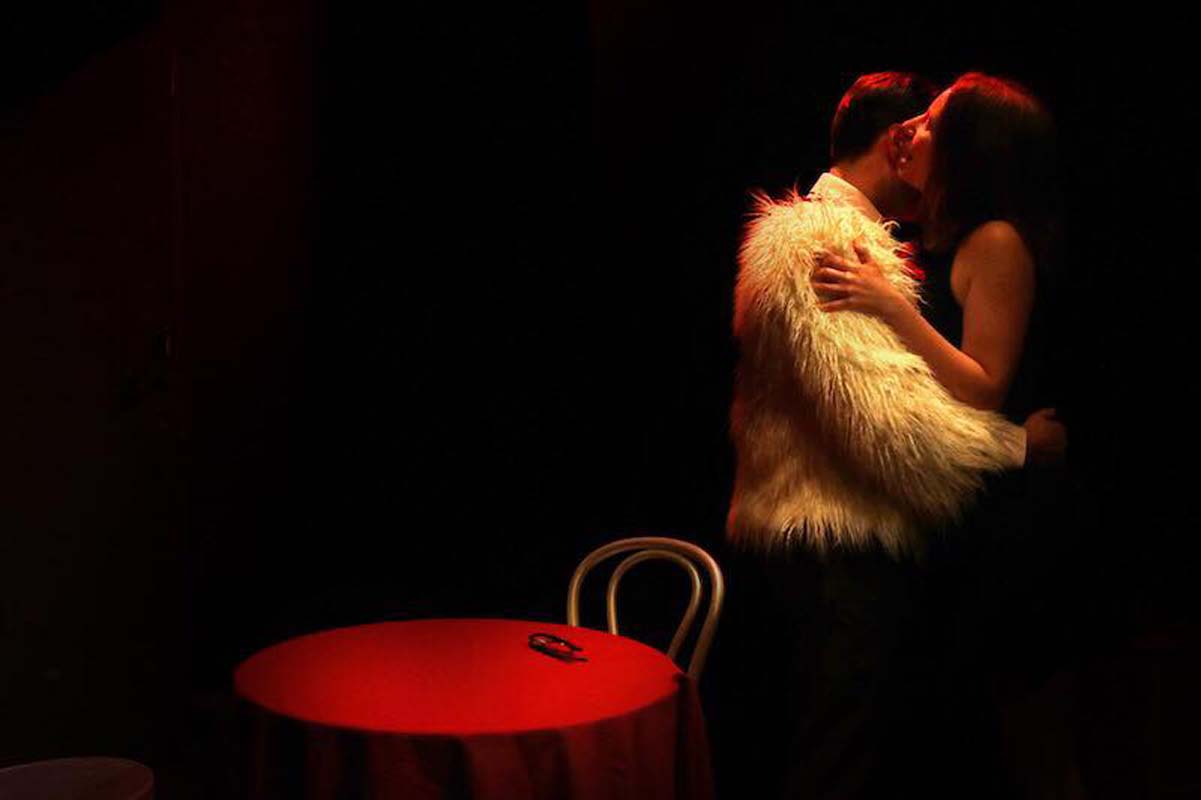Tulips, written by Michael Beakhouse and directed by Adrian Tang, is a difficult piece of theatre to review.
So much of its effectiveness revolves around two things which are hard to quantify in writing: an audience’s interpretations of its themes, and their response to its big narrative shift.
The former you will have to find out for yourself – and I would encourage you to go and see Tulips before its run at South Hill Park ends on Saturday – and the latter I will try not to mention too much, for fear of giving away the play’s secrets.
This much I will say though: it tackles a difficult topic with bravery and commitment, and will ensure that you leave the theatre with much to think about.
Plot wise, Tulips revolves around a support group for ‘men who can’t admit there is a problem’ – in other words, men with a history of domestic abuse. Christine (Victoria Paterson) runs the group, with her long-term member Jason (Peter Taverner) helping her along. Into this group walks Alex (played by writer Michael Beakhouse), who’s relationship with Scarlett (Heather MacEachern) has quickly turned difficult.
The story follows Alex and Scarlett through the rocky roads of an abusive relationship, mirroring their story with that of Jason trying to convince Alex to commit to the group and get the help he needs to make things right.
This is Alex’s story, mainly, and Michael Beakhouse plays him with a nervous, twitchy energy that hints at the struggles underneath his pristinely suited surface.
Beakhouse brings a certain public schoolboy charm to the character, punctuating the seriousness of the subject matter with moments of humour.
Despite being the protagonist of the piece, Alex does a lot of sitting and listening to the other characters talk, especially in the second half; Beakhouse brings a lot to those moments, even in his silence, and when he does speak he does so with affecting emotion.
The play’s best moments are the interactions between Alex and Jason in the waiting room of the men’s support group. Peter Taverner as Jason is the real standout of the cast, mixing his physically intimidating stature with moments of wonderful warmth and wisdom.
Jason is flawed to the extreme, but captivating for it, and his monologue towards the end of the play was my personal highlight, as Taverner weaved his tragic tale with clear and moving skill. His performance is worth the ticket price on its own.
If the strength of the play is how three dimensional its male characters are, the one place it could perhaps be criticised is in its women. Heather MacEachern does well with the role of Scarlett, and it is a challenging one, jumping from one emotional extreme to the other at breakneck speed; MacEachern performs commendably to ensure those jumps never seem too scripted (or give the audience emotional whiplash).

There is the slight feeling that the role of Scarlett is there simply to explore Alex rather than being fully realised herself. She is there to drive the plot, and does so well, but I would have liked to see more of the motivations behind the surface of an extremely complex woman.
That said, MacEachern capitalises on her tragic backstory, drawing sympathy in recounting her past experiences with men.
Victoria Paterson has the least to do as Christine, the woman behind the Tulips support group, but what she does she does with warmth and confidence. Her monologue at the start of the play does a lot to settle the audience’s nerves – and there are some, with the play promising an exploration of such a heavy topic.
Patterson’s light humour, her belief in biscuits to help through challenging situations, and her character’s inspirational commitment to her cause are an excellent doorway to guide the audience into the thorny subject of the play.

Adrian Tang, as director (and artistic director of Exit Pursued by Panda, the company responsible for bringing Tulips to life) has a tricky job of pulling together Beakhouse’s intricate script.
It jumps around from location to location at speed, and for the most part Tang pulls it off with admirable clarity, splitting the stage into three discrete locations: the waiting room, a bar, and Alex’s bedroom.
The play works best when it embraces these locations simultaneously, such as phone calls happening across the stage, or Scarlett putting out Christmas decorations while Christine talks to Jason.
However, especially at the beginning of the piece, there are some weird directorial choices which jar slightly; a number of conversations or moments happen offstage, causing the actors to shout their lines and lose some of the subtley.
There is also interesting use of sound, with radio snippets and static intruding the dialogue – at times, this works brilliantly, such as one argument between Scarlett and Christine being underscored by loud music which heightens the tension and sense of chaos.
At other times, it emphasises the ever so slightly choppy nature of the opening scenes, breaking the flow somewhat. Visually, Tang plays nicely with colour, letting the red of the tulips seep slowly into the other locations, symbolising the abuse taking root in the relationship.

Overall, Tulips is well worth seeing, even if just to see for yourself how you feel it deals with its difficult subject matter. According to the play’s marketing, it has had a somewhat controversial reception, and you can see why; however, for my part, I would say it deals admirably with its thorny themes, bringing compassion and bravery to it stories, and trying, above all, to shine a light on a subject which is all too easy to brush under the carpet.
Well done to the company for tackling the topic, and for the Studio Theatre Company at South Hill Park for scheduling this amidst their usual, more crowd pleasing line up.
The cast and director are partaking in a Q and A after every performance, and it’s well worth sticking around – they are remarkably open and willing to talk, both about the creative side of the performance, as well as their intentions regarding the themes.

Tulips runs at South Hill Park’s Studio Theatre until Saturday, May 18, at Bath Fringe Festival from May 31 to June 2, and at Guildford Fringe on July 25.
For more details, or tickets, click here














































